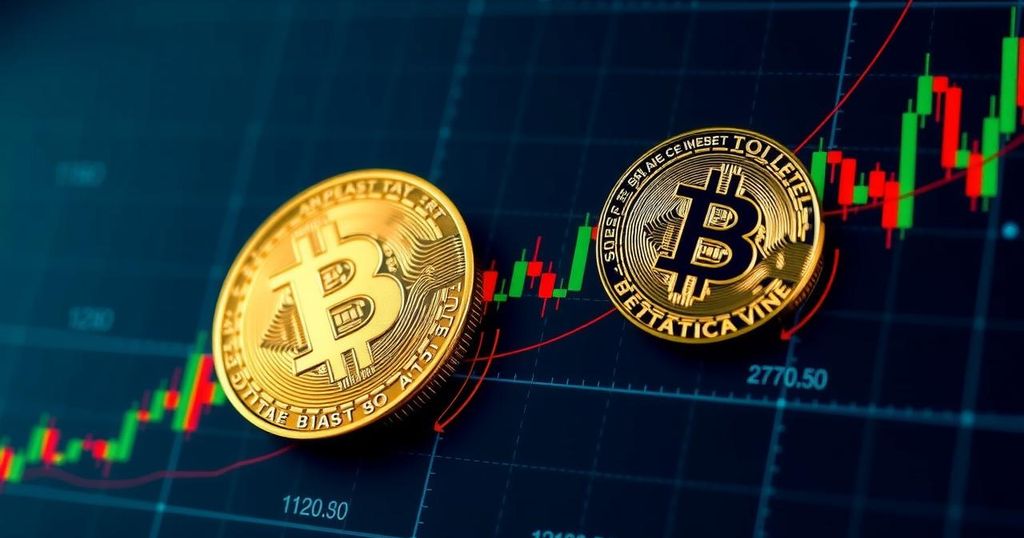Impact of Japan’s New Leadership on Cryptocurrency Markets and Bitcoin Prices
The election of Japan’s new Prime Minister Shigeru Ishiba has led to volatility in financial markets, particularly affecting Bitcoin, which decreased by 4%. While market apprehensions arise from potential interest rate hikes, some analysts suggest that such hikes may not occur due to the current economic conditions in Japan. The yen’s role as a key macroeconomic variable raises further concerns about the broader implications on crypto prices. Analysts advise caution and close observation of ongoing financial policies.
Japan’s recent political development, with the election of Prime Minister Shigeru Ishiba, has triggered notable fluctuations within the financial markets, particularly affecting the cryptocurrency landscape. Following his election, Japanese stocks and various risk assets experienced a significant downturn. Bitcoin, which peaked at approximately $66,300 over the weekend, plummeted 4% to around $63,500. This market reaction primarily stems from Ishiba’s history of advocating for the Bank of Japan to implement interest rate hikes and his support for other stringent economic measures, including increased corporate taxation. In July, the Bank of Japan executed its second interest rate hike this year, resulting in substantial losses within the crypto sector, and investors are now apprehensive about potential further increases. Contrarily, Steven Glass, an analyst affiliated with Pella Funds Management in Sydney, posits that Ishiba’s election may stabilize interest rates in Japan, contrary to widespread market fears. “The BoJ is highly unlikely to increase its policy rates,” Glass stated during an appearance on CNBC’s Squawk Box. He argues that the current economic climate in Japan, characterized by low inflation, does not support further hikes. The recent election news follows a robust performance of Bitcoin, which surged around 20% in September, defying earlier market predictions. An interest rate reduction of 0.5% by the Federal Reserve, paired with fiscal stimulation from the Chinese government, has relaxed financial conditions and subsequently uplifted risk-sensitive assets like cryptocurrencies. The influence of the Japanese yen on the crypto markets remains profound, as highlighted by BitMEX founder Arthur Hayes who dubbed it “the most important macro variable.” Hayes previously contended that a depreciation of the yen could catalyze a Bitcoin rally, yet the July interest rate hike fortified the yen, prompting Japanese investors to liquidate carry trades involving US stocks and bonds—a strategy that typically exploits lower interest rates to invest in higher-yielding assets. Consequently, this led to significant sell-offs across global stock markets, with Bitcoin’s value crashing below $50,000 for the first time since January. Although rate increases can help manage inflation, they concurrently bolster a nation’s currency, undermining the competitiveness of exports—a critical component of Japan’s economy. Hence, any indications of an impending interest rate hike from the Bank of Japan could instigate another decline in market confidence, at least until further interest rate cuts from the United States are anticipated later this year, which may favor bullish sentiments in the cryptocurrency realm.
The relationship between Japan’s monetary policies and cryptocurrency values has been a topic of significant interest among investors and analysts alike. The election of a new Prime Minister and the strategic decisions made by the Bank of Japan regarding interest rates can cause ripple effects across global markets, particularly in the volatile realm of cryptocurrencies. Understanding the implications of these policies, including the dynamics of the Japanese yen, provides critical insights into potential market movements. The role of external economic factors, such as Federal Reserve decisions and Chinese monetary policies, further complicates the landscape.
In summary, the election of Shigeru Ishiba as Japan’s Prime Minister has introduced uncertainty into the financial markets, directly impacting the cryptocurrency sector, particularly Bitcoin. While market fears concerning possible interest rate hikes are prevalent, analysts like Steven Glass suggest that stability may prevail. The influence of the yen remains pivotal in the ongoing dialogue about macroeconomic variables affecting the crypto markets, indicating that investors should remain vigilant regarding both local and international economic policies moving forward.
Original Source: www.dlnews.com








Post Comment